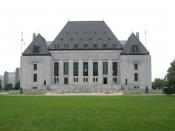The relationship between the principally westernized concept of Rule of Law and the Islamic foundation of Shari'ah law have such fundamental differences that the contemporary melting pot of our multicultural society is being impeded by way of a divergence of customs. Where the premises of multiculturalism is to encourage equality while allowing citizens old and new to maintain their identity and take pride in their ancestry, it is also crucial to determine how this fits into the Canadian legal system. There are key ideological differences between the philosophically based Rule of Law and the religiously based Shari'ah as part of the Islamic Koran. Although there are proponents and adversaries to both concepts, neither can be supposed correct without first examining each conviction as it applies to Canadians. Furthermore, the political theory surrounding each model has its own antagonizing systems, particularly the critical legal studies movement, which focuses on a legal realist perspective rather than the declaratory model that tends to discern Shari'ah law and Rule of Law. Also, in turning to a predominantly traditional method of sentencing practiced by Native Canadians as an alternative to the common judicial process known by the majority of the populace, we can achieve a healthier understanding of legal alternatives in our ethnically diverse society.
The Rule of Law has as many philosophies as there are political theorists. Arguably the first political philosophers, Plato and his student Aristotle, were the first proponents for the Rule of Law. Although they had the benefit of a clear distinction between rule and rule by enforcement, even teacher and student had dissimilar conceptions of an ideal declaratory body. Aristotle prophesized of a constitution to provide everyone with equal merit and the same rights, while incorporating a rotation of office as an alternative to a monarch who traditionally...


